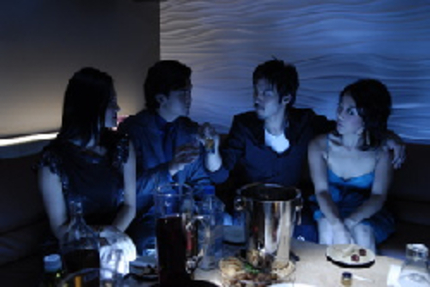SDAFF Report: West 32nd Review

The 8th edition of the San Diego Asian Film Festival broke attendance records during its run from October 11-18. Among the attendees was our friend Wells Dunbar, who faithfully submitted a report on the final night of the festival in a timely fashion. My apologies for the delay in posting his review of Michael Kang's new film.
The San Diego Asian Film Fest came to a rowdy end with a sold-out screening of West 32nd, a Korean-American gangster potboiler from festival favorite Michael Kang. Billed as the West Coast premiere, it was West 32nd's third major screening after a Tribeca debut and Pusan International Film Festival showing.
Director Kang, who won the Best Narrative Feature two years ago at SDAFF for The Motel, sets West 32nd in the rain-slicked streets of New York's Koreatown, and its upscale, private "room-salon" clubs. When the manager of one of these mob-affiliated host-clubs is slain – supposedly by a 14-year-old gunman – ambitious young lawyer John Kim (John Cho) takes the case pro bono to further his firm's Korean ties. The case leads him to the accused' s sister (played by Grace Park), and a volatile gang underboss (newcomer Jun Kim).
It's apparent Kang was swinging for the bleachers; as he told the Q&A audience afterwards, with relatively tight financing, "we wrote The Departed, but had to film Mean Streets." West 32nd looks sleek and atmospheric, and its design, ranging from moneyed clubs to dingy noodle-houses, is excellent and evocative. A solid performance from Cho anchors the film, even if the plotting grows troublingly oblique as the film continues. Either due to script holes or financial constraints, characters and their interconnections remain unexplored fully, and the crescendo signs bode for never arrives. An open ending satisfyingly suspends any sense of relief, but the last word between Cho and Kim's characters seemingly goes unspoken.
Aside from being the first major motion picture to film in New York's Koreatown, it also marks K-film giant CJ Entertainment's first foray into American moviemaking. It's in this shared heritage, this heady mix of Korean and English, that West 32nd's most realized expression of its dark ambitions lies. In noir, we're accustomed to truth being a malleable thing, revealed when advantageous and discarded when inconvenient. Here, it's not only words that can't be trusted, but languages; John Kim's limited Korean puts him at the mercy of an unreliable narrator who's not above skewing the truth.
This confusion of tongues was attractive to Kang; he forced himself to direct several scenes of Korean dialogue despite not knowing the language. This cultural amalgamation found a more singular expression in the words of star Cho: while being both a Korean and a Korean-American film, he found it a "New York film" overall. Kang also addressed the specificity to setting West 32nd in New York's Koreatown; unlike Los Angeles' Koreatown, balkanized off from other Asian enclaves, in New York Koreatown and Chinatown brush against one another, resulting in "a lot of tension."
West 32nd is on track for a November release in Korea, and a stateside opening early next year – possibly around the same time Cho hits multiplexes in Harold and Kumar 2, rolling out February 8. He closed noting rehearsals for the J.J. Abrams-imagined Star Trek prequel – where he plays a young Mr. Sulu – begin for him next week.
Review by Wells Dunbar







